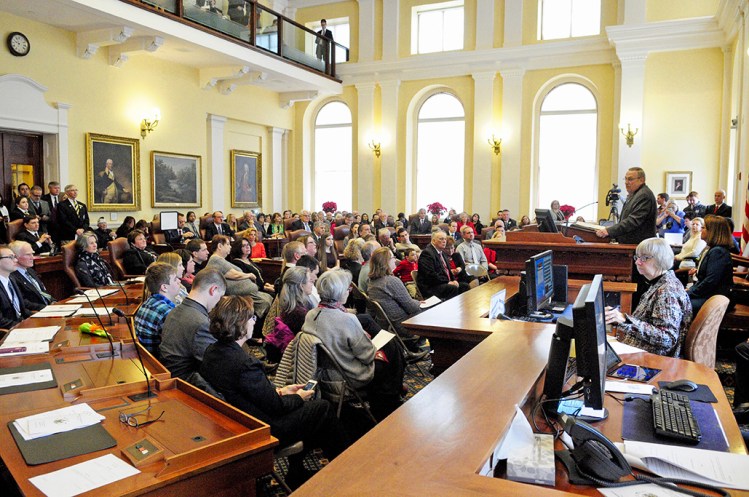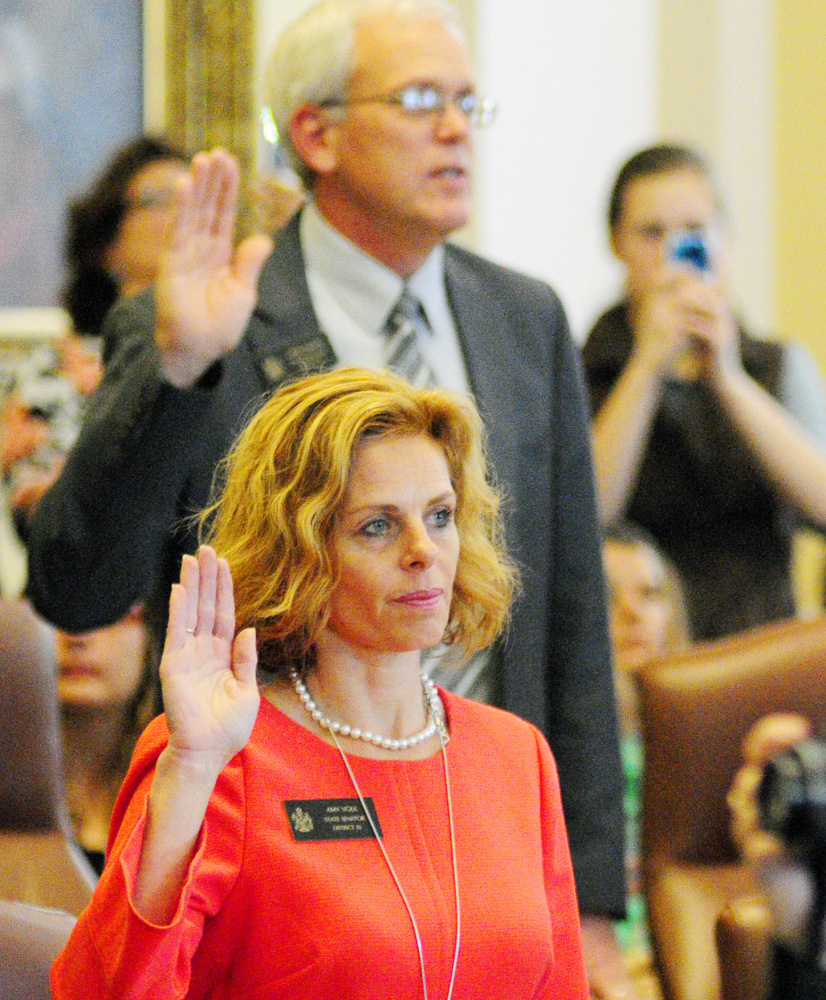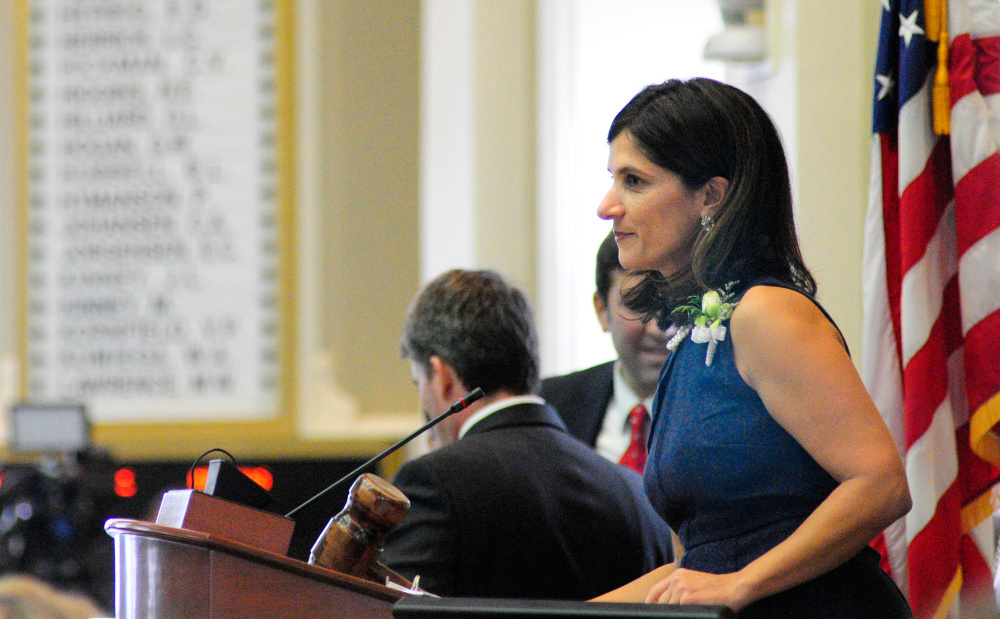AUGUSTA — Gov. Paul LePage swore in members of the 128th Legislature on Wednesday, but not before urging lawmakers to change two referendum measures passed by Maine voters in November.
LePage said the ballot initiatives to raise Maine’s minimum wage to $12 an hour by 2020 and to impose a 3 percent tax surcharge on individual income above $200,000 a year will hurt the state’s economy. He said the tax surcharge, which will fund education programs, is already prompting wealthy Mainers to explore moving to income tax-free New Hampshire, while the minimum wage hike will harm small businesses and elderly residents living on a fixed income.
“We all accept the will of the people. But first, as sworn elected officials, we must not do harm to our economy,” LePage told newly elected senators.
LePage’s remarks, which he delivered before administering the oath of office to lawmakers, added a political edge to a largely ceremonial day when lawmakers pose for pictures with their families and elect leaders and key legislative staff. They also underscored the especially unpredictable nature of the session, in part because of ramifications from the Nov. 8 referendum votes.
LePage said he will introduce legislation to delay implementation of the wage increase and to keep the so-called “tip credit” for restaurant workers, which would be phased out under the ballot initiative approved by 55 percent of voters. LePage warned that elderly and disabled Mainers will be unable to afford the higher costs of goods that he predicted will result from the higher minimum wage, causing “a real death spiral to our elderly.” LePage repeatedly made similar claims during the campaign.
The Republican also said eliminating the tip credit – which currently allows employers to pay employees 50 percent of the minimum wage as long as their tips make up the difference – will harm Maine’s critically important food service industry.
“I’m asking you to work with me to try to find a system that will work for everyone and that will do no harm to our economy, but most importantly to our elderly, to our disabled and to our mentally ill,” LePage told the House. Some business leaders also are lobbying lawmakers to adjust the planned increase.
SUPPORT AT THE POLLS
Maine’s minimum wage is scheduled to increase from $7.50 an hour to $9 an hour on Jan. 1 under the timeline laid out in Question 4 on the November ballot. Wages would then increase annually by $1 until the minimum hits $12 in 2020, after which the wage would be pegged to increases in the federally calculated cost of living.
For service workers who receive tips, wages would increase from $3.75 an hour to $5 an hour in 2017 and rise $1 an hour annually. By 2024, when the tip credit would be phased out, service industry workers would be paid a minimum hourly wage of $12.
A leader of the Question 4 campaign to increase the minimum wage, Mike Tipping with the Maine People’s Alliance, said he doesn’t expect to see the Legislature vote to roll back a wage increase that won such strong support at the polls.
“Obviously his motivation is to use an opportunity like this, where he can’t be asked questions, to put forward lies about the minimum wage – things like the effect on seniors and on restaurant workers,” said Tipping, a frequent target of LePage’s criticism. Tipping said one in three Mainers over age 65 will see their wages increase because they are still working, and that the dramatic price hikes predicted by LePage and other opponents have not happened in other states that recently increased the minimum wage, or in Maine during previous increases.
“The people voted overwhelmingly for it,” Tipping said. “It was a very clear question. I don’t think people misunderstood what they were voting for.”
Under the state’s constitution, the Legislature could repeal or alter any of the ballot questions. Just like any other law, the Legislature could change the new citizen-enacted laws if it has the votes to enact a bill that has the governor’s support.
Sen. Mike Thibodeau, a Winterport Republican who was elected Wednesday to his second consecutive term as Senate president, said that after the recent divisive elections, lawmakers will have to collaborate on major issues.
“This means we are going to have to work together and find common ground that we don’t even know exists,” Thibodeau said, noting that constituents voted for lawmakers to get things done, not because they are good at “partisan bickering.”
Newly elected House Speaker Sara Gideon, D-Freeport, set a similar tone as she pledged to lawmakers that she will “always work together to find common ground.”
“We will always remain at the table, we will not walk away so long as we have a willing partner who is negotiating in good faith on the other side,” Gideon said. “When we work together we are capable of great things.”
Gideon told reporters after her election as speaker that the Democratic agenda is simple. “Number one, more jobs, and number two, help get Maine people in a better place,” Gideon said.
MORE WORK TO DO
During her floor speech Wednesday, she said a lot of progress has been made in recent years, but there is more work to do.
“More work to give our children and grandchildren the quality education they deserve, more work to fix our crumbling roads and bridges, more work to create the basic infrastructure of modern broadband that is so necessary for our economy, more work to make Maine more energy independent, more work to fight back against this devastating opioid epidemic that continues to take lives, more work to provide health care, child care and elder care to those in need,” she said.
Gideon praised two Republican members for their work to increase access to naloxone, the opioid overdose antidote commonly known by its brand name Narcan.
She said Reps. Deborah Sanderson, R-Chelsea, and Rich Malaby, R-Hancock, were instrumental in pushing legislation forward in 2016 despite LePage’s opposition.
“And though increasing access at first seemed like it could fall into the partisan abyss, both Rep. Sanderson and Rep. Malaby became the leaders who changed the conversation, helped bring us all together and ultimately saved hundreds of lives since,” Gideon said.
Thibodeau and Gideon will have to work closely with lawmakers from both sides to accomplish anything substantial during the legislative session. Not only are the two chambers controlled by different parties, the margins in both chambers are razor thin: Republicans hold a one-seat majority in the 35-member Senate, and Democrats outnumber Republicans 77 to 72 in the House, which has two independents.
LePage will likely continue to serve as the wild card, as he has in previous legislative sessions when he vetoed budgets – and hundreds of other bills – and occasionally sparred with legislative leaders, including from his own party.
BUDGET CUTS POSSIBLE
In addition to spearheading attempts to roll back aspects of the minimum wage ballot initiative, LePage has made it clear that he plans to introduce a budget that will contain another round of income tax cuts aimed, in part, at counteracting the 3 percent tax surcharge assessed on incomes above $200,000 under Question 2. He has indicated that he will propose significant spending reductions to pay for the tax cuts.
“These folks already pay most of our taxes,” LePage said Wednesday. “If they leave and take their income with them it will result in less money for education, less revenue for property taxes, less sales tax and less excise tax.”
Lawmakers in both chambers listened quietly – and intently – as the governor spoke. While LePage clearly sought to set the agenda for the upcoming session with his remarks, Senate Minority Leader Troy Jackson questioned whether legislators will be willing to tinker with issues clearly endorsed by voters.
“I’m always happy to listen and to work with the governor, but at this point I don’t see how it can be changed at all,” said Jackson, D-Allagash. “I appreciated his tone, though. I didn’t think it was over-the-top. But I think there are a lot of ways to make this economy move, and those are the things we should be focused on.”
Likewise, Gideon said Democrats were not interested in making dramatic changes to the intent of the laws passed by voters, especially the minimum wage increase.
“We’ve been talking about this for two weeks and my answer is the same, the priorities for Democrats is making sure that when people are working full time they can actually put food on the table and pay the rent,” Gideon said. “That’s why we had a minimum wage ballot question in front of us, the Legislature failed to act repeatedly, the people said, ‘We need this to get done.’ They spoke loud and clear and we are going to honor that.”
In a joint session of the House and Senate later Wednesday, lawmakers voted to re-elect incumbents to fill the constitutional officer positions of attorney general, treasurer and secretary of state. Attorney General Janet Mills, a Democrat, Treasurer Terry Hayes, an independent, and Secretary of State Matt Dunlap, a Democrat, each were re-elected to another two-year term.
Send questions/comments to the editors.






